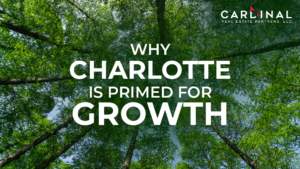I’m going to take a break from the coronavirus and share some good news.
I recently ran across an article, Charlotte Surges into the First Rank of U.S. Growth Markets.
In it, the author praises “The Queen City’s emergence as one of the world’s hotbeds of innovation in fintech.” The author also applauded the city’s population and job growth, and the city’s multifamily development.
The article gives a nod to a changing environment due to COVID-19, but states that the “expected RE investment returns are impressive.”
Yes, a lot is changing now and in ways we can’t yet predict. However, this article reminded me of why I am so bullish about our city.
Here’s why Charlotte will rebound better than other metropolitan areas its size:
Charlotte is number 2. This is a city that is the second-largest financial center in the US. Charlotte is Home of Bank of America, Truist (BB&T/Suntrust) and Wells Fargo’s largest employment center. Banktown USA is “primed” to come out of this downturn with a solid employment base.
$2B in Fintech. The Queen City has quietly been growing as a Fintech hub in the US. It is the crossroads where digital technology and financial institutions meet. As an example, last week’s stimulus bill will reportedly have three months to process more than 10 times the dollar amount it issued all of last year. It is a golden opportunity for local fintech companies like Lendstream.
Fortune 500s: There are 6 F500s and 15 F1000s headquartered in Charlotte USA. This base of stable employers, and the businesses that support them, will weather the storm and seize future opportunities.
Historically, Charlotte has given CRE investors strong returns: The underlying value proposition for investing in Charlotte RE has not changed. A RED Capital Research report points out the following: “Intrepid investors were handsomely rewarded last year. Our Reis-based calculations suggest that typical metro properties chalked down an approximate 10 percent NOI increase in 2019. At the same time, cap rates applied to institutional quality properties plunged as many as 30 basis points to sub-5 percent levels, generating total returns approaching 20 percent. Nice work if you can get it.”
“Commercial real estate returns typically lag the rest of the economy. So you can expect CRE returns to be more of a swoosh if the economy rebounds like a V.” (Credit to CBRE)
Look, the city is not out of the woods yet. But Charlotte has been here before and weathered the downturn of 2008 better than many thought that it would. Being at the heart of the CMBS crisis, many expected that the real estate downturn would devastate the city.
So while in these uncertain times it can feel like that the vision of “Shiny Charlotte” is in jeopardy, rest assured that this city’s best days are ahead. I challenge our leaders to believe that this is the time to bring your new ideas forward. It’s time to launch new objectives and to be proactive, resourceful and useful to our community.







